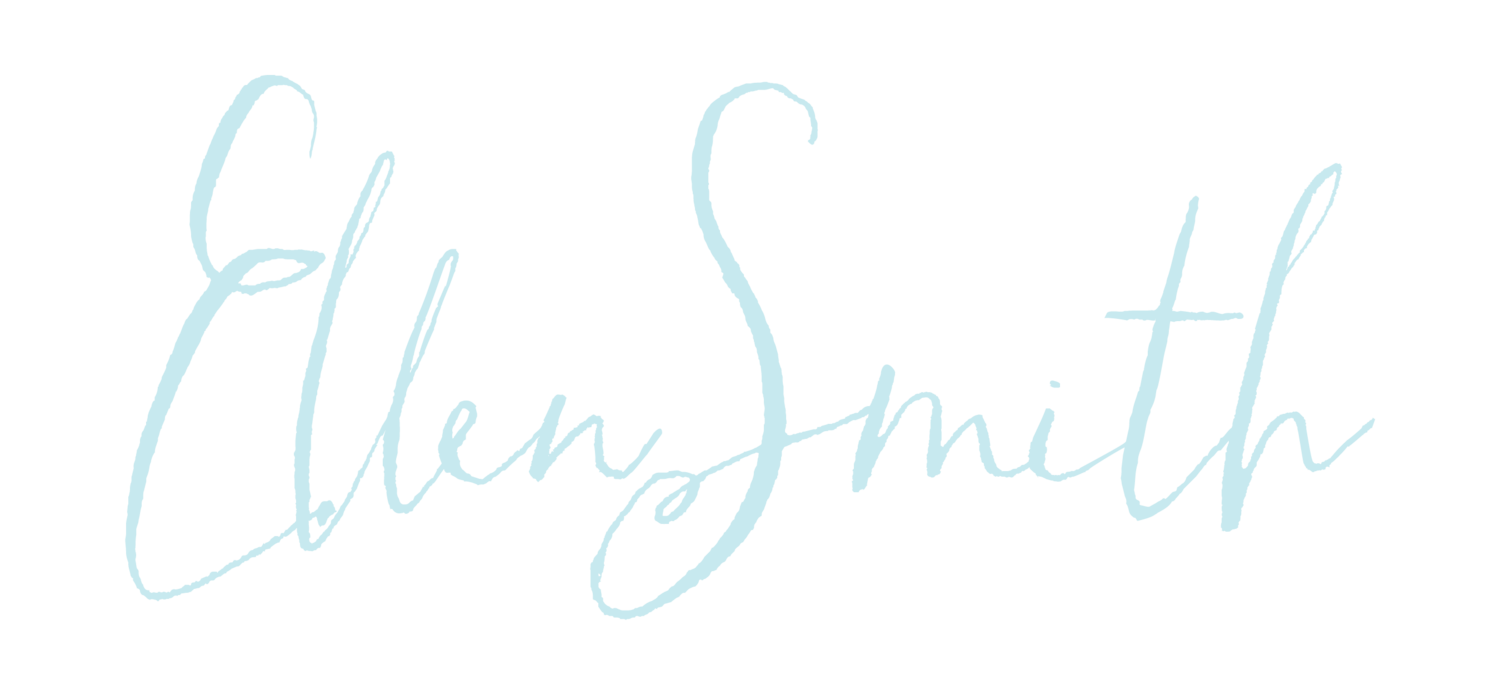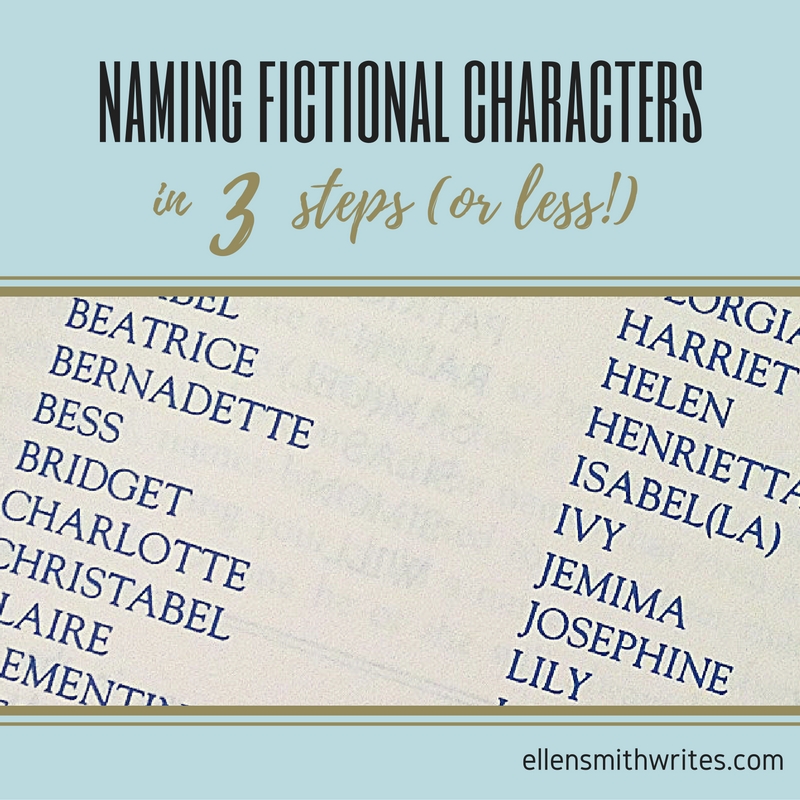I’m a name nerd.
True story: in college, I spent hours compiling data for a study on the attractiveness of male and female names. I mean, hours. I remember a lot of long nights crunching data. Amanda? Very attractive. Mildred? Not so much. Ken was more attractive than Keith, while Liam was about as attractive as Levi. By the end of the study, I had an Iliad-length research paper and a major caramel-macchiato addiction.
Ah, youth.
Believe it or not, even after all of that research, I still get excited to dream up the perfect names for my characters. There’s something about finding just the right name that makes the character start to take shape in my mind. Since I have a tendency to get stuck on finding the perfect name (Maura or Mara? Lila or Lily?), I try to break the process down into just three steps.
Meaning
For my main characters, finding a name with the right meaning is a great first step. I like for the character's name to have a meaning that reflects something about his or her personality. Even if most readers don't know that Bridget means "strong" or Arthur means "noble," finding a name that encompasses a key element of the character helps me stay focused as I'm developing the story.
In my current work-in-progress, for example, I actually have two main characters: a newlywed husband and wife. While I was pre-writing, I knew that each character would have very different inner conflicts. The husband would be driven by his desire to protect the people he loves. I flipped through a baby book and discovered that William means “the determined guardian.” That's a great description of the character I had in mind, so I decided to call him Will.
The wife character’s conflict was slightly different. I knew she was someone who would struggle with how she reacted to the roadblocks in her life. She would want to think positively and believe that everything she faced made her a better person, but truthfully, she would struggle with feeling bitter. That reminded me of a line spoken by a character in the biblical Book of Ruth.
“Call me not Naomi (meaning pleasant) but Mara (meaning bitter) for the Lord has dealt very bitterly with me.”
Even though my female protagonist tries so hard to stay positive, I knew that she would connect with that deep feeling of bitterness. Mara was the perfect name for her.
Sometimes I put the cart before the horse and choose the name first, then derive elements of the story from the name’s meaning. This is what I did with Arden, the main character in Reluctant Cassandra. When I was taking a class in Shakespeare (again, college) I stumbled across the name Arden in the play As You Like It. If it’s been a while since you’ve read works by the Bard, most of this play takes place in the Forest of Arden. I thought Arden would be a beautiful name for a girl: strong but sweet, unusual but not weird. When I first envisioned a down-to-earth character with a fantastical gift of prophecy, the name Arden immediately sprang to mind.
Although I chose the name based on my own personal taste, I went ahead and looked up the meaning while I was pre-writing. It turns out that Arden actually means “valley of the eagle.” Voila! From there, I had the name of Arden’s fictional small town: Eagle Valley, Virginia.
As much as I love diving in to name meanings, I can't do this for every single character of every story. Even if I skip the step of looking up a name's meaning, I always make sure to think about how a character's name reflects their culture.
Culture
My characters might be figments of my imagination, but I hope that they feel like real, authentic people to the reader. In real life, a person's name generally reflects their parents' taste, cultural expectations, and even family traditions. Children are usually named when they're babies, so parents are more likely to be inspired by their own hopes and dreams for their child instead of the child's looks or personality. Nicknames usually come later and are more likely to reflect personality or individual traits. When I choose a name, I try to think about both the larger culture the character lives in as well as their smaller, family culture.
Think about the sisters from Little Women: Margaret, Josephine, Elizabeth, and Amy. It’s totally believable that these are the names of girls who were raised in America in the 1800s. They’re classic, traditional English girls names that fit the time period and the region.
The smaller, family culture comes through in the nicknames that some of the girls have. Margaret, the oldest and a mother hen, is called the practical nickname Meg instead of a spunkier version, like Maggie. Elizabeth, the gentlest, most sensitive sister, goes by soft, sweet Beth. And best of all: the tomboy sister that struggles with anything fussy and feminine is never called Josephine, just Jo. Since the girls are young adults (er, little women), we can imagine that these nicknames evolved over time because of their personalities.
(Amy is the only sister in Little Women who didn’t get a nickname, and it’s always bugged me. Was her first name just that perfect, or did Louisa May Alcott run out of nickname ideas? Thoughts?)
A little research into popular names for a certain region or time period helps generate believable names for a range of major and minor characters. For Reluctant Cassandra, I looked up names that are frequently used in the South to fit the small-town Virginia setting. For my current work-in-progress, I looked up popular American baby names for the 1980s to fill in the names of Will and Mara's friends. I was born in the 80s too, so a lot of these names were very familiar to me! They fit the bill for twentysomethings living in D.C. in the early 00s.
Several of the characters in my current work-in-progress aren't originally from America, and their names have cultural significance as well. For example: Nayana, a traditional Indian name, was a good choice for a woman whose parents expect her to live and work in America but stay connected to her Indian roots. On the other hand, a Japanese-American family in the story name their daughter Laura after the pioneer girl in the Little House series. Laura's family constantly pushes her to be more "American," and that's reflected in the name they chose for her.
Even if a name has a great meaning or suits the culture of the setting perfectly, there's one more nitty-gritty step I have to consider: practicality.
Practicality
This is the part where my name nerd hat comes off and I put my writer hat on instead. Some name choices that would be very realistic just don’t work in books. For example, many of us have had the experience of being in class with three Zacharys or growing up in a neighborhood with Madelyn, Madeline, and Madeleine. That’s true in real life, but it’s confusing for the reader if characters have similar-sounding names.
Recently, I had to change the names of several of my minor characters because I realized they all sounded too much alike: Justin, Jessie, and Kevin. Jessie was a female character with a much different personality than Justin, so I didn’t think it would matter that both names started with J. However, whenever they got into an argument, the whole back-and-forth Justin-said-Jessie-said part got really confusing. Justin and Kevin were too close, too. Even though they started with different letters, they’re two-syllable names that rhyme with each other. When I re-read their pages aloud, I kept getting confused about which one said what.
My naming process may have only three steps, but it can be pretty time-consuming! Just considering meaning, culture, and practicality can keep me on my toes throughout the prewriting stage. These are a few tools that help me while I'm naming characters:
The Social Security Administration
Did you know the Social Security Administration releases a list of the most popular baby names in America every year? Now you do. If you need to get your hands on popular American names from any year from 1879 to present day, this is the resource for you. When I’m looking for characters that just have a small role, I’ll usually pick from the top ten list of the year or decade they were born.
Nameberry
Nameberry is a really neat website where users compile lists of their favorite names and give feedback on the names they like and why. There's even a Writer's Corner forum specifically for authors looking up character names!
Nymbler
If a name I love just isn't working, nymbler.com is a fun tool for finding similar names. You can enter up to six inspiration names and the site will generate a list of names that reflect the same general style, origin, or popularity. Bonus: if there's a name you absolutely won't consider, you can add it to your "blocked names" list.
Baby names book
I like the type that simply lists all the names and their meanings. You can probably find one at the grocery store checkout line or something. I have a few from the 1990s and early 00s. I'm also a fan of the books by Linda Rosenkrantz and Pamela Satran, who are the creators of the Nameberry website. Their most recent book is Beyond Ava and Aidan, although I got mine back when the current book was Beyond Jennifer and Jason.
Are there any other name nerds out there? What are some of your favorite character names? Leave me a comment and let me know!

